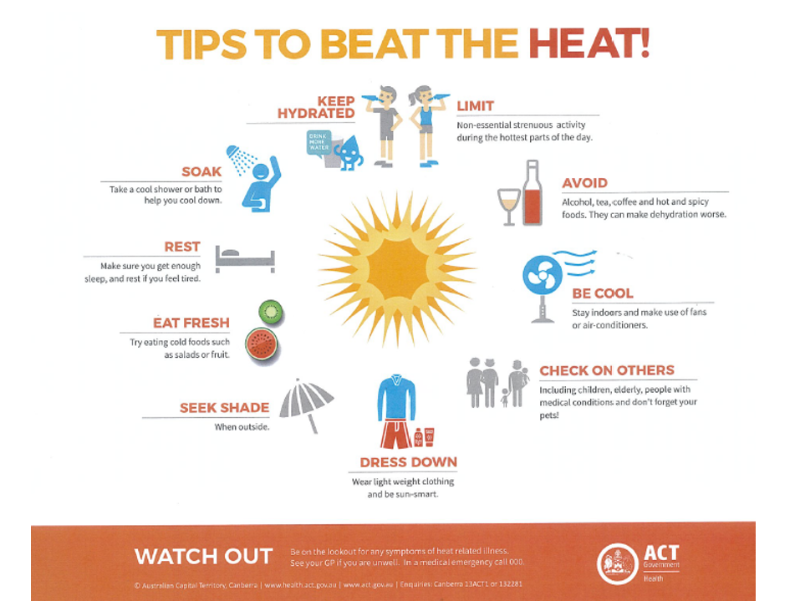
Caring for an older person during extreme heat
- Carers are encouraged to check on an older person on days forecast for hot weather. Especially if they live alone.
- Visit them if you can, rather than just talking on the phone.
- Ensure they are drinking enough water
- Look for any changes to their physical condition.
- Have plans to keep them cool if there is a power outage.
- Check if their phone and devices such as safety alarm pendant will work if there is no electricity.
Eating and drinking during hot weather
- Check that you have water in the fridge and drink regularly.
- Avoid drinking tea, coffee or alcohol.
- Ensure you have a bottle of water close by to avoid becoming dehydrated.
- Try to eat smaller meals, more often during hot weather.
- Use the stove or oven in your kitchen as little as possible.
- Ensure that food needing refrigeration is properly stored and defrost frozen foods in the fridge not on the kitchen bench.
Clothing and personal aids during hot weather
- Wear lightweight, light-coloured and loose-fitting clothing.
- Natural fibres like cotton or linen are best. Avoid synthetic or nylon fabrics.
- Use sunscreen (minimum SPF30+) even if you are going outside for a short time.
- Apply it under the sleeves and collar of a blouse or shirt to cover the neck.
- Also apply it on legs and feet if wearing shorts or sandals.
- Wear a hat that shades the face, neck and ears.
- Always wear sunglasses outside.
- Take off sunglasses before going inside and pause inside to help eyes adjust to change in light and prevent an accident.
- To avoid any burns, check that a wheelchair, walker or other metal equipment does not become hot
Taking medication
- Ensure you continue to take prescribed medicines during hot weather.
- Some medicines can make you more prone to sunburn and heat stress.
- Take extra care to watch for signs of becoming affected by the heat.
- Speak to your doctor or pharmacist if you need more advice about medicines you are taking.
Heat-related symptoms
Know the signs of heat-related illness, look out for symptoms including:
- increased thirst
- tiredness
- feeling dizzy or faint
- confusion
- headache
- muscle spasms or cramps
- loss of appetite.
What to do for heat-related symptoms
- Take steps to cool down straight away.
- Use cool baths or showers, or place cool, wet towels on the neck and underarms.